#PUBLIC IMAGE First Issue 1978
Explore tagged Tumblr posts
Text


THROWING THE FIRST WAVE PUNKS UNDER THE PROVERBIAL BUS WITH THE ART DIRECTION ALONE.
Concept: Terry Jones, Dennis Morris
Design: Zebulon a Zebulon Production
Photography: Dennis Morris
Label: Columbia (Japanese pressing)
Original Release: December 1978/12 inch analog recording
Resolution at 1400x1403 & 1128x1094.
"I was very hurt by the reviews of the first album. The flak we took at the beginning was unbelievable. A few people understood it, got it, but a lot of people were seriously offended by it, because they wanted their regular traditional rock."
-- JAH WOBBLE (English musician/bassist), "Fodderstompf," c. 1999
Sources: https://no4ko4.com/2020/09/public-image-first-issue, Atlas Records, & Fodderstompf.
#PUBLIC IMAGE#Jah Wobble#Post-punk#PUBLIC IMAGE 1978#John Wardle#70s#PUBLIC IMAGE LTD.#PUBLIC IMAGE LTD#First Issue 1978#1978#PiL First Issue#PiL#Super Seventies#Dennis Morris#PUBLIC IMAGE First Issue#Sleeve Art#1970s#PUBLIC IMAGE First Issue 1978#Typography#Iconography#Cover Art#Dub bass#Virgin Records#PiL 1978#Photosession#Photoshoot#Photography#PUBLIC IMAGE LIMITED#Bass guitarist#PiL First Issue 1978
2 notes
·
View notes
Text

1 note
·
View note
Text
The Cadence of Part-Time Poets











The Cadence of Part-Time Poets by @motswolo
Have been working on this 10 volume set for the past few months now, and they are finally complete. My Magnum Opus. I have peaked and probably depleted all of my brain power.
Thank you to @motswolo for writing such a beautiful story. My brain chemistry has been favourably altered. Will forever flinch when I hear Queen, The Beatles or Bob Dylan. Love to you from western Canada (west coast best coast lets gooooo).
I also posted a TikTok Reel of these since posts here are limited and I love the insides as much as the covers, so if you wanna see between the pages, here’s that.
Also thank you @avisbindery for letting me scream and cry in your DMs while I read the fic. May you get some uninterrupted sleep now LOLLL.
Going to write a whole essay below about the ideas and details because uhhh I wanna yap bit!
So for starters, I wanted to make these binds look like magazines because of the epilogue where (spoiler) Tonya sees Remus in a copy of New Musical Express. But of course this fic is long, so I was like, what if I do multiple volumes? This very quickly spiralled into me painstakingly (finding publication-accurate fonts almost sent me to an early grave) recreating 10 different music-focused magazines from the 70s and 80s from scratch (thank you to Photoshop, Affinity, Procreate and Canva). Each volume features a unique cover, along with stylized typesets to match that display the songs for each chapter but in different designs. And then I went a little crazy and made a 45 sleeve and a cassette too, to really set the scene when I took the photos lol
While the covers display the dates pertaining to the contents of that particular volume (Sept 1975 for volume one, for example) I was thinking about what the magazines would say if they were really published when Marauders are traipsing about being spectacular and famous in the future. I sprinkled in details from the fic itself and fanon-ed it a bit, but that was the general inspiration :-) Tried to keep the photos used either faceless/obscured, or to use the fancasts on Mots’ Cadence master post. I also tried to use period-accurate photos but didn’t always succeed, so settled for photos of 4 member bands where I had to :”) But the general intent with the facelessness was that they could be implied to be Marauders. If you squint? lol. Just pretend. Pls.
Volume One: Based upon The Record Song Book. This magazine went on to inspire the typesets, since it publishes lyrics and such. The cover images are of Spacey Jane and David Thewlis.
Volume Two: Based on ZigZag, specifically the issue from July 1978 featuring Siouxie and the Banshees just because I thought it looked sick as fuck. I re-drew the abstract shapes and such in procreate. The cover images are The Clash and a young Gary Oldman. Lord he was foiiine.
Volume Three: Based on Trouser Press, November 1980. The cover images are a young Metallica, and my personal fav fan cast for James, Reiky De Valk. The film negatives are from a Bruce Springsteen tour, 1976.
Volume Four: Based on Gay Times (November 1984), a queer magazine from the UK because this volume contains Wolfstars first kiss hehe. Also hence Somebody To Love plastered all over the covers. The Front cover is Inhaler. The “4A” on this one is of course the boys’ dorm number, but I made the A the lambda symbol as this was a pride symbol in the 70s after Stonewall.
Volume Five: Based on Melody Maker. Front image is Alex Turner. All of the text on this one is pulled directly from the fic. The scene where they all drop acid and James jumps off the roof Almost Famous style had me hootin’ and hollerin’… until Tomny showed up hahaha :”)
Volume Six: Based on IT (International Times, Aug 1971). Front image for this one is Joy Division, and the back features Jane Asher for Lily
Volume Seven: Based on Record Mirror, June 1976. Front image is John Taylor of Duran Duran. Yum.
Volume Eight: Based on Rolling Stone. More vibes than anything for this one, but the quote still makes me laugh. Front image is of Matt Hitt. Can you tell I photoshopped a cell phone out of this one? IDK. This photo just screamed ‘Remus’ to me so I had to use it. The back image is an old cigarette ad, but the photo is taken in Shepherd’s Bush.
Volume Nine: Based on Fusion magazine. Front image for this one is once again Inhaler. Oops. Back cover is our gals. Images are Jodie Foster as Cherry, Brenda Sykes as Mary, and Goldie Hawn as Lottie.
Volume Ten: Based on New Musical Express. You know why :”) These are all victims of fanon, but this one especially. I wanted it to be NME instead of the re-invented logos I’d been doing for all the rest, as I wanted it to look like the magazine the Sister gives to Tonya. I referred to an issue of NME from October 1979 for this and layered in fic references where it made sense to. The cover image for this one is (I think) Cigarettes After Sex. This issue also contains all of the B-Side chapters, and the Marauders song lyrics too just for fun :)
Slasher Chick: This is just my take on what Sybill’s zine could’ve looked like. Prob way off but I just wanted to have fun with this one since I had no cover to reference lol. The zine contains her little write-up and the interview, lifted straight from the fic :")
ok yap sesh over byeeeeeeeeeeeeeeee lmfaooooo
#fic: the cadence of part-time poets#motswolo#wolfstar#fanfic#sirius black#remus lupin#james potter#peter pettigrew#regulus black#bookbinding#tcoptp#coptp#the cadence of part time poets#marauders#moony#padfoot#my binds
1K notes
·
View notes
Text
youtube
PUBLIC IMAGE LTD-PUBLIC IMAGE
#PUBLIC IMAGE LTD.#PIL#Public Image: First Issue#PUBLIC IMAGE LIMITED#POST PUNK#POST-PUNK#ALTERNATIVE MUSIC#1978#Youtube
1 note
·
View note
Text




Public Image Ltd.
Public Image (First Issue) (1978)
30 notes
·
View notes
Text
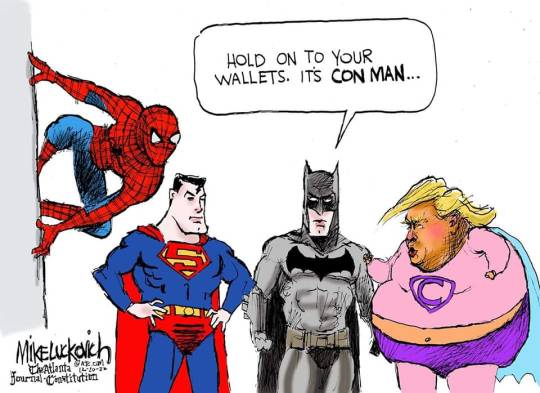
LETTERS FROM AN AMERICAN
January 1, 2025
Heather Cox Richardson
Jan 01, 2025
Twenty-five years ago today, Americans—along with the rest of the world—woke up to a new century date…and to the discovery that the years of work computer programmers had put in to stop what was known as the Y2K bug from crashing airplanes, shutting down hospitals, and making payments systems inoperable had worked.
When programmers began their work with the first wave of commercial computers in the 1960s, computer memory was expensive, so they used a two-digit format for dates, using just the years in the century, rather than using the four digits that would be necessary otherwise—78, for example, rather than 1978. This worked fine until the century changed.
As the turn of the twenty-first century approached, computer engineers realized that computers might interpret 00 as 1900 rather than 2000 or fail to recognize it at all, causing programs that, by then, handled routine maintenance, safety checks, transportation, finance, and so on, to fail. According to scholar Olivia Bosch, governments recognized that government services, as well as security and the law, could be disrupted by the glitch. They knew that the public must have confidence that world systems would survive, and the United States and the United Kingdom, where at the time computers were more widespread than they were elsewhere, emphasized transparency about how governments, companies, and programmers were handling the problem. They backed the World Bank and the United Nations in their work to help developing countries fix their own Y2K issues.
Meanwhile, people who were already worried about the coming of a new century began to fear that the end of the world was coming. In late 1996, evangelical Christian believers saw the Virgin Mary in the windows of an office building near Clearwater, Florida, and some thought the image was a sign of the end times. Leaders fed that fear, some appearing to hope that the secular government they hated would fall, some appreciating the profit to be made from their warnings. Popular televangelist Pat Robertson ran headlines like “The Year 2000—A Date with Disaster.”
Fears reached far beyond the evangelical community. Newspaper tabloids ran headlines that convinced some worried people to start stockpiling food and preparing for societal collapse: “JANUARY 1, 2000: THE DAY THE EARTH WILL STAND STILL!” one tabloid read. “ALL BANKS WILL FAIL. FOOD SUPPLIES WILL BE DEPLETED! ELECTRICITY WILL BE CUT OFF! THE STOCK MARKET WILL CRASH! VEHICLES USING COMPUTER CHIPS WILL STOP DEAD! TELEPHONES WILL CEASE TO FUNCTION! DOMINO EFFECT WILL CAUSE A WORLDWIDE DEPRESSION!”
In fact, the fix turned out to be simple—programmers developed updated systems that recognized a four-digit date—but implementing it meant that hardware and software had to be adjusted to become Y2K compliant, and they had to be ready by midnight on December 31, 1999. Technology teams worked for years, racing to meet the deadline at a cost that researchers estimate to have been $300–$600 billion. The head of the Federal Aviation Administration at the time, Jane Garvey, told NPR in 1998 that the air traffic control system had twenty-three million lines of code that had to be fixed.
President Bill Clinton’s 1999 budget had described fixing the Y2K bug as “the single largest technology management challenge in history,” but on December 14 of that year, President Bill Clinton announced that according to the Office of Management and Budget, 99.9% of the government's mission-critical computer systems were ready for 2000. In May 1997, only 21% had been ready. “[W]e have done our job, we have met the deadline, and we have done it well below cost projections,” Clinton said.
Indeed, the fix worked. Despite the dark warnings, the programmers had done their job, and the clocks changed with little disruption. “2000,” the Wilmington, Delaware, News Journal’s headline read. “World rejoices; Y2K bug is quiet.”
Crises get a lot of attention, but the quiet work of fixing them gets less. And if that work ends the crisis that got all the attention, the success itself makes people think there was never a crisis to begin with. In the aftermath of the Y2K problem, people began to treat it as a joke, but as technology forecaster Paul Saffo emphasized, “The Y2K crisis didn’t happen precisely because people started preparing for it over a decade in advance. And the general public who was busy stocking up on supplies and stuff just didn’t have a sense that the programmers were on the job.”
As of midnight last night, a five-year contract ended that had allowed Russia to export natural gas to Europe by way of a pipeline running through Ukraine. Ukraine president Volodymyr Zelensky warned that he would not renew the contract, which permitted more than $6 billion a year to flow to cash-strapped Russia. European governments said they had plenty of time to prepare and that they have found alternative sources to meet the needs of their people.
Today, President Joe Biden issued a statement marking the day that the new, lower cap on seniors’ out-of-pocket spending on prescription drugs goes into effect. The Inflation Reduction Act, negotiated over two years and passed with Democratic votes alone, enabled the government to negotiate with pharmaceutical companies over drug prices and phased in out-of-pocket spending caps for seniors. In 2024 the cap was $3,400; it’s now $2,000.
As we launch ourselves into 2025, one of the key issues of the new year will be whether Americans care that the U.S. government does the hard, slow work of governing and, if it does, who benefits.
Happy New Year, everyone.
LETTERS FROM AN AMERICAN
HEATHER COX RICHARDSON
#Con Man#Mike Luckovich#Letters From An American#heather cox richardson#history#American History#Y2K#do your job#the work of government#Inflation Reduction Act#technology management#the hard slow work of governing
14 notes
·
View notes
Photo

7:57 PM EST February 11, 2025:
Public Image Ltd - "Attack" From the album First Issue (December 8, 1978)
Last song scrobbled from iTunes at Last.fm
File under: Rotten Johnny
6 notes
·
View notes
Note
ok so I watched Pistol like a month ago and I've been obsessed about the Sex Pistols ever since and I even read a couple of books on the band and I honestly feel so sad about them. Like It's weird how social media just made up a discourse about them and they don't even care how there were so young and exploited. I'm not justifying what John became and all the stuff Sid did, but Malcolm really exploited boys that already had issues and used them.
i understand how you feel anon. i feel the same way
the older i get, the younger the Sex Pistols seem. Steve, the oldest member of the band, was 23 when they broke up in 1978. the Pistols started gigging around in 1975. they were kids and they spent some of the most formative years of their lives (age 19-24 are the years of transition from teenagehood to adulthood and therefore very crucial in a person's development) being seen as public enemy number one by a majority of the ppl in britain, the insane tabloid press that slandered them non-stop, and the government of england that straight up considered trying them for treason. btw in the 70s you could be given the death penalty if you were found guilty of treason in england
Johnny and Paul were both nearly murdered in 1977. Paul wasnt even old enough to drink in america when random ppl twice his age decided that he deserved to die for having an opinion on the monarchy that wasnt positive. they beat him with an iron rod and left him in the street. Johnny has permanent nerve damage due to being stabbed through the hand and all of his friends at the time report him becoming so traumatized by this incident that he would run in terror if he thought someone was following him or looking at him weirdly
ppl will tell you that the Sex Pistols were violent, malicious ppl. theyre dead fucking wrong. the Sex Pistols were normal kids who just wanted to play music for other kids like them. they (aside from Sid) were never violent unless they were defending themselves or friends. 99% of the violence that surrounded the band was directed AT them
Johnny, Steve, and Sid had incredibly difficult childhoods and have very obvious mental health issues (Steve is pretty open about his struggles with mental health. the other two arent bc one of them committed suicide and the other would likely rather die then go to a psychiatrist). they were thrown from the fires of child abuse, homelessness, drug abuse, and poverty into the hell that is being the media's favorite punching bags and the designated 'acceptable targets' of an entire nation
to me the Sex Pistols were the most punk out of all of the first generation British bands. bc whats more punk then a band started by an abuse survivor who stole all of his musical equipment and taught himself how to play? whats more punk then having the government of your country against you and refusing to back down? whats more punk then fighting tooth and nail for your right to say what you want even when they try to censor you time and time again? whats more punk then refusing to change who you are and what type of songs you play even when ppl want you dead for it? whats more punk then throwing a christmas party with toys and cake for the kids of striking firemen?
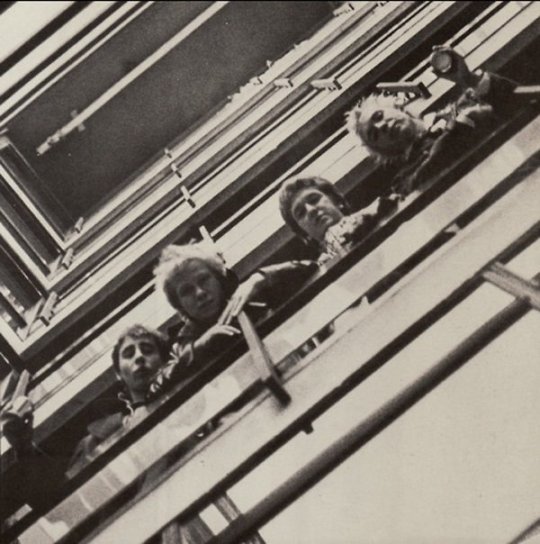
the image of the Sex Pistols as cartoon villains for some other more virtuous band to 'defeat' is not only completely false but its also pathetic. they were normal kids who didnt want to be famous or to be seen as the figureheads of a revolution. they wanted to play music, have fun, and shake things up so that the world would be more interesting for bored kids like them
#hoodies q and a#sex pistols#punk rock posting#anonymous#i got passionate and i wont apologize for it!#music ppl
10 notes
·
View notes
Text
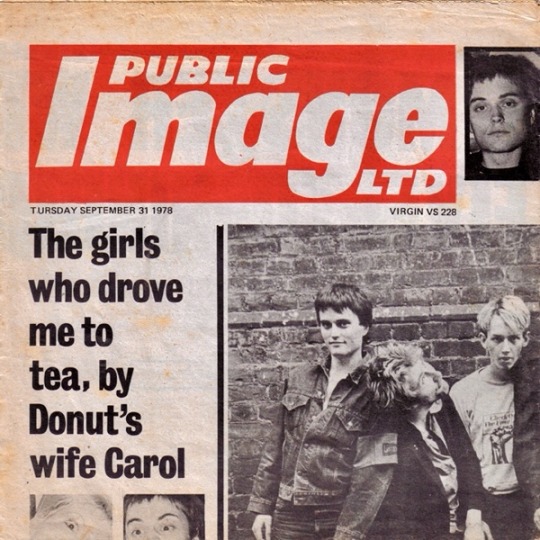

Public Image Ltd. - “Public Image” (1978)
Forty-six years ago today, on October 13, 1978, “Public Image,” the debut single by Public Image Ltd., was released. Written by John Lydon while he still a member of the Sex Pistols, the song specifically addresses his feelings of being exploited by impresario Malcolm McLaren and the stifling atmosphere of his old band. Released in advance of the band’s debut album, the single entered the UK chart at number 21 and peaked at number 9. However, it was deemed too non-commercial for a US release and only released on a compilation album in 1980, and First Issue, the debut album, wouldn’t see an official US release until 2013. While the song was received well at the time, its true legacy is now seen as planting many of the seeds of post punk.
4 notes
·
View notes
Text
Tracy Jordan
Tracy Jordan (1966-March 17, 2026) was an American actor and musician active from 1978 until his death. Jordan was born in Yankee Stadium and, owing to both the unusual location and the simultaneous focus on the arrival of the world-eater Galactus by most public officials, was not officially issued a birth certificate. Jordan grew up in the Knuckle Beach neighborhood of the Bronx, which was infamous for high crime rates and general dysfunction. The Cult of Quetzalcoatl regularly abducted sacrifice victims from the neighborhood, a fate which Jordan only narrowly avoided on at least two occasions. Owing to his family’s precarious financial situation, Jordan eventually dropped out of high school and relied on sporadic odd jobs such as acting as a busboy at the legally dubious ‘McDowell’s’ restaurant in Long Island. Jordan longed for bigger things, however, being drawn to acting after a chance encounter with actor Charles Hayden Savage while he was filming an episode of Brazzos. Jordan was able to become a cast member on the short-lived show Ray Ray’s Mystery Garage which aired on IBC from 1978 to 1980. Once the show ended, Jordan became a street performer who specialized in basket drumming for cash on the streets of New York City.
Jordan’s ultimate break would not come until 1984. That year, Jordan heard about the Apollo Theater’s Amateur Night and decided to perform stand-up during it. During the performance, Jordan proved popular with the audience which happened to include prominent comedian Jonathan Crunk. Crunk, viewing Jordan as having potential, took him under his wing and was able to get him his first big breakthrough of adulthood by joining the cast of Studio 60 in the 1987-1988 season. Jordan was a cast member on the show for over a decade, during which he played many notable roles. During the Gulf War and Eugenics Wars, Jordan regularly portrayed General Warren Boutwell giving bombastic and at times derailed press conferences and continued to depict him after Boutwell exited the military to start a restaurant. He also participated in many parodies of the children’s show Mr. Robinson’s Neighborhood, including an infamous sketch where he portrayed the eponymous Robinson vandalizing the setting of My Friendly Neighborhood to reduce completion. Jordan additionally played a camera operator in Studio 60’s infamous Gordy’s Home sketch, which was never aired after the original airing in 1998. Jordan attracted praise for many of his performances and was able to leverage his new status to advance his career further.
Jordan began his music career in this time, intially mainly recording novelty songs in the vein of the late ‘Weird Al’ Yankovic. However, Jordan soon sought to branch away from this. He joined the Lethal Interjection Crew in 1994 but left two years later after a falling out with its leader Thugnificent. Jordan released several rap singles throughout the 1990’s but was never able to release a full album which thus prevented him from earning full-fledged stardom in the world of music. Jordan also acted in several B-movies during this era, including Cleaver II, Who Dat Ninja, Rescue Bay: The Movie, Hard to Watch, Angels With the Filthiest Souls and The Crows Have Eyes, as well as several episodes of the Night Springs revival. Jordan also dabbled in voice acting, primarily in English dubs of Japanese anime series thanks to connections with Japanese production companies he formed while filming Samurai I Amurai. Jordan notably participated in the English dubs of Tinymon, Pink Dark Boy and Mew Mew Kissie Cutie (a performance which was widely panned and Jordan claims was done ‘to buy a vacation house’). Jordan also got married during this time to Angie Shepherd, though initially he refused to acknowledge the marriage to maintain a playboy public image.
In 1999, Jordan expressed disappointment he was stuck with B-movies and comedies and announced he was quitting in favor of directing, announcing his first project would be a serious. biopic of President Douglass Dilman with he himself in the role of the nation’s first African-American president. However production hit snags quickly. Jordan had not asked the Dilman family for permission to make such a film and a spokesman denounced the idea of Jordan making such a movie. He additionally announced his friend Vincent Chase had been cast as a member of Dilman’s Secret Service detail before Chase committed to the role and the two had a falling out when Chase publicly said he had never signed on to the role. The production ground to a halt when his executive producer (who de facto was a second director) Roman Bridger was killed after becoming yet another in the infamous chain of Ghostface murderers. Despite this, Jordan continued to try to go through with the film, pouring much of his own money to salvage it, but in the end His Accidency would never make it to audiences.
Some have suggested the erratic behavior Jordan began displaying in the 2000’s was a result of frustration his more serious artistic intentions were blocked. It has been suggested Jordan’s infamous 2003 trip to Wadiya and public embrace of the nation’s dictator Haffaz Aladeen was a scheme to try to get money from Aladeen to sustain his movie. During the 2001 dot com recession, Jordan expressed a positive attitude towards the infamous Project Mayhem, drawing widespread criticism. Jordan also, on multiple occasions, assaulted paparazzi with various improvised weapons, including a prop from the original Galaxy Wars that Jordan had purchased for $2 million at a charity auction. These controversies caused significant damage to Jordan’s career and by the mid-2000’s, Jordan was nearly bankrupt and struggled to find work. However, he was able to secure a leading role in the sketch comedy series The Girly Show in 2006, which subsequently was rebranded as TGS With Tracy Jordan and took on a renewed life as a program no longer solely targeting a female audience. Jordan did continue to draw controversy–a PSA where he told African-Americans ‘don’t vote’ aired three times before Jordan requested it be taken off the air–but it did enable a greater deal of stability. Jordan was able to have the financial security to pursue a more stable interest in his hobbies such as American history, a passion he picked up after learning of his descent from Thomas Jefferson and his slave Sally Hemmings. He played a crucial role in funding the team that debunked the claims of the so-called ‘Washingtonians’ clan of cannibals that they were descended from George Washington. During Jordan’s time on TGS also involved recurring feuds with co-star Jenna Maroney, though the two would ultimately leave the show on amicable terms. Jordan’s career arguably peaked in this time period as he ultimately became an EGOT winner after winning all 4 of the entertainment industry’s most prestigious awards.
After the conclusion of the show, Jordan once again developed a controversial reputation. After the Awakening of Magic, Jordan would begin to espouse a number of human supremacist sentiments. He would be temporarily banned from The Circle after calling for killing vampire celebrity Lestat de Lioncourt and the expulsion of Prince Krel of Akiridion from Earth after he criticized Jordan’s comments. Jordan also was temporarily arrested after egging Justin Russo following his election as President of the Magical Congress of the United States in 2015. Jordan would announce a presidential bid on a human supremacist–but otherwise rather left-wing–platform in 2016, though he failed to obtain ballot access and was only able to earn status as a write-in in the states of New York, Illinois and Winnemac. Beyond this political drift, Jordan also was dogged by more mundane celebrity scandals. Jordan got into a physical altercation with pop musician Connor4Real in 2014 that led to him being hospitalized with a broken pinkie. His wife’s reality show Queen of Jordan drew controversy for an episode where the Jordans insisted on continuing a California vacation even in the midst of a kaiju attack which was accused of encouraging dangerous behavior by the Pan-Pacific Defense Corps. Jordan did begin to calm down after his personal physician, Dr. Leo Spaceman, was arrested for helping manufacture Substance-D and Jordan revealed Spaceman had been giving him some of the said substance while claiming it was vitalizing medicine, a factor helping drive his erratic tendencies.
Citing a desire for more privacy, Jordan would move to Canada in 2019, where he remained through the COVID-19, Kongoli flu and Alvin virus outbreaks. Jordan was thus not in the US when the President’s Day Massacre occurred and installed David Jefferson Adams as President. Jordan denounced the coup attempt and expressed support for the efforts of the Left Eye and other groups to violently resist the far-right takeover of America, causing a rift between him and his old employer Jack Donaghy (who, while opposed to the coup attempt, favored a strategy of nonviolent resistance). Jordan announced another bid for the presidency in 2024 and gained some traction after the Adams-stacked court disqualified Governor Georgina Hobart from consideration. Jordan announced former Republican Senator Alex Keaton as his running mate and was, surprisingly, allowed to run by the Adams regime, though Adams’ allies within the New Founding Fathers movement likely only did so presuming Jordan’s status as a de facto exile and history of erratic behavior would weaken his chances. Jordan would officially received 12% of the popular vote and won a faithless elector from the state of Vermont who defected and voted for Jordan after another elector was arrested for voting for the state’s socialist former Senator Julian Felsenburgh. Jordan would remain in Canada for the rest of his life, as his poor physical health meant that when a resurgence of the Kongoli flu occurred in 2026, it proved to be a fatal infection. Jordan died on the same die as his TGS co-star Maroney, who also died of Kongoli flu in New York City–in an eerie parallel to Jordan’s ancestor Thomas Jefferson and his rival/friend John Adams.
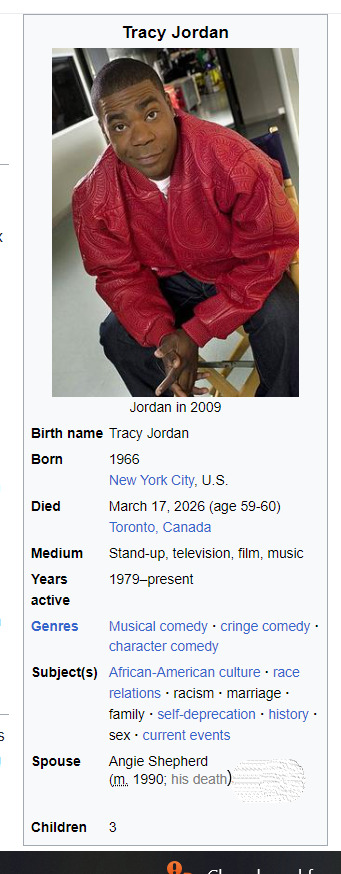
References
30 Rock, Marvel Comics (The Coming of Galactus, ), Q: The Serpent God, Coming to America, Only Murders in the Building, Scrooged, Carter’s Army, Studio 60 on the Sunset Strip, Star Trek, Undercover Brother, Saturday Night Live, My Friendly Neighborhood, Nope, Weird: The Al Yankovic Story, The Boondocks, The Sopranos, Baywatch, Home Alone, Schitt’s Creek, Alan Wake, Johnny Test, JoJo’s Bizarre Adventure, Undertale, The Man, Entourage, Scream, The Dictator, Fight Club, iCarly, Masters of Horror, Shadowrun, Interview With The Vampire, 3Below, Wizards of Waverly Place, Harry Potter, Works of Sinclair Lewis, Popstar: Never Stop Never Stopping, Pacific Rim, A Scanner Darkly, The End of October, The Sadness, The Handmaid’s Tale, Shattered Union, Sorry to Bother You, The Politician, Family Ties, The Purge, Lord of the World
4 notes
·
View notes
Text
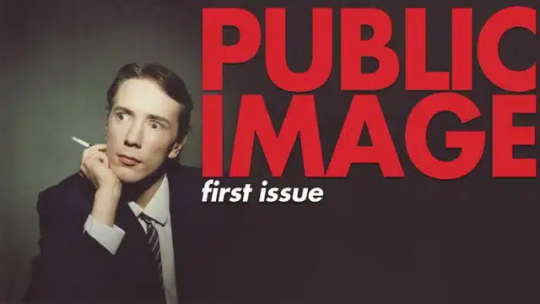
"... PUBLIC IMAGE LTD, CONSISTED OF NEW FORMS MADE WITH ROCK AND ROLL INSTRUMENTATION."
PIC INFO: Spotlight on the typography and/or iconography of "First Issue," the debut album by English post-punk band PUBLIC IMAGE LTD, released by Virgin Records on December 8, 1978. Sleeve concept by Terry Jones & Dennis Morris. 📸: Dennis Morris.
FUTURE SOUND?: "Rock and roll — the loud, fast, and furious fusion of R&B and country, born in the mid-1950s — had been reenergized, brought to fruition, and blown to smithereens by this one movement.
Meanwhile, one possible future of rock and roll, the one posited by PUBLIC IMAGE LTD, consisted of new forms made with rock and roll instrumentation. Those new forms traded R&B for the deeper grooves of funk and reggae. They stripped out folk and country. They disdained cohesion and steadiness and favored loose ends and asymmetry.
These changes added up not to what we know today as rock but to anti-rock, which we know today as post-punk. Specifically, this music, whatever its name, was a racket purveyed by PiL’s leader, the provocateur formerly known as Johnny Rotten, now back to his birth name of John Lydon."
-- POP MATTERS, "PUBLIC IMAGE LTD’S Debut Album Put the "Post" in Post-punk," by Kurt Wildermuth, January 12, 2024
Source: www.popmatters.com/public-image-ltd-debut-album-atr.
#PUBLIC IMAGE LTD.#PUBLIC IMAGE 1978#PUBLIC IMAGE#PUBLIC IMAGE LIMITED#PUBLIC IMAGE LTD#First Issue 1978#Post-punk#1978#PiL First Issue#PiL#Super Seventies#Dennis Morris#70s#PUBLIC IMAGE First Issue#Sleeve Art#1970s#PUBLIC IMAGE First Issue 1978#Typography#Iconography#Cover Art#John Lydon#Virgin Records#PiL 1978#PiL First Issue 1978#Record Adverts#Photosession#Photoshoot#Photography
0 notes
Text

JACQUELINE "JAC" ISABELLA FABRAY
⚑ GENDER: Ciswoman ⚑ PRONOUNS: She/Her ⚑ AGE: 47 (February 5, 1978) ⚑ TYPE: Half sibling ⚑ HOMETOWN: New York City, New York ⚑ SEXUALITY: Lesbian ⚑ JOB: Sous chef for Luce ⚑ ACCOMMODATION: Diamond ⚑ FACECLAIM: Lena Headey
ABOUT JAC
child abuse and homophobia tw Jac despised her father. A product of his first relationship in college, she’d always felt like an inconvenience, like she was somehow ruining his life just by existing. She never knew her mom, according to Russell she was a drug addict and would’ve made a terrible parent, but it was okay because he’d decided, out of the goodness of his heart, to not give her up, but to raise himself instead. And by that, he meant pawning her off to his own parent’s or other relatives to look after her while he lived his life as if she didn’t exist. When Russell met Judy as he made his first million, Jac was seven. She never really had an issue with her stepmother, although she never really believed that Judy was with Russell for any reason but his money, but that wasn’t really her problem. He seemed happy enough with his new wife, and at least it meant that Jac wasn’t alone in their ridiculously large house. Judy never attempted to be her mother, but she didn’t treat Jac the same way that Russell did, with a lot of apathy and disdain for her interests in art and punk rock. She wouldn’t encourage it either, and once she was pregnant with hers and Russell’s first child, Jac went back to being unnoticed and in the background, leaving her wondering what it was she did wrong. Of course, Jac eventually realised that she hadn’t done anything wrong, she just didn’t fit their perfect family image. She stuck out like a sore thumb, and when Russell started excluding her from the family photo ops at church and volunteering trips, Jac didn’t actually mind. She could just do her own thing, like dye streaks of blue in her hair, stay out long past curfew with her friends, and smoke cigarettes out of her bedroom window while listening to her favourite heavy metal songs on full volume.
Jac would continue to push boundaries, to test where the line was of things she couldn’t do, and when she found there wasn’t one as long as she didn’t embarrass Russell in public, she gave up trying. Nothing she did would capture his attention, good or bad, so Jac may as well carry on like the roommate they treated her like rather than a member of the family. Russell had something of a temper, and while he didn’t really care what she did, he’d still blow up at her frequently for her ‘disrespect’ towards him, or her ‘ungodly’ choices. It wasn’t that bad though, not until the night he caught her and her girlfriend at the time in the middle of having sex. Jac didn’t think he’d really care about it, it wasn’t like he’d ever shown an interest in her dating life, but she was very wrong. Once her girlfriend had left, Russell slapped Jac so hard across the face he split her lip, knocking her to the floor before beginning a tirade of fury and abuse about how wrong and immoral she was for not only having pre-marital sex under his roof, but for doing it with another girl. Jac had had enough at this point, sixteen years of being ignored and treated as an annoyance, as less important than his ‘real’ family, and now he had an opinion about who she was becoming? No, no way. She unleashed sixteen years of hurt and rage in his direction, filled with more than a few cuss words that had made Judy faint from the shock of hearing them all strung together, and then headed back to her room, throwing her clothes, toiletries and electronics into a duffel bag, and left Russell’s house for good.
She never spoke to him again, never returned to the Fabray house or attempted any kind of contact with any of them. Why would she? It wasn’t like any of them stood up for anyway. Although, years later, when she heard about the divorce and Russell’s numerous infidelities, Jac had laughed herself sick at the hypocrisy of it all. She spent a couple of years couch surfing, dropping out of high school and earning money by lying about her age and working behind a bar in Hell’s Kitchen. It wasn’t like they vetted her that closely anyway, Jac figured they probably knew she was only sixteen, but it wasn’t exactly a reputable establishment. Eventually, Jac decided it was time to figure out what she wanted to do with her life, despite her lack of formal education, and after quitting her terrible bartending job, she got a position as a dishwasher in a restaurant. It was there that Jac fell in love with cooking, fascinated by the inner workings of the kitchen she was scrubbing pans in. The head chef seemed to notice the way that Jac would watch his techniques, the natural curiosity she seemed to have, and decided to take her under his wing. With his help, Jac learnt to cook like she never had before, learnt how to order produce, how to pick the best cuts of meat and freshest fish at the market. It meant many very early morning starts and late-night finishes, but for the first time in her life, Jac felt like someone actually cared about her and took interest in seeing her succeed. Succeed she did, quickly working her way up the kitchen ranks over the next decade until she made it to sous chef. Jac loved her job, and for many years she was content to just work beside her mentor in the kitchen, the two in perfect sync and Jac seeing him as the pseudo father figure she never had. She was even invited to spend the holidays with him, his wife and their two kids, and not once did she ever felt out of place or like she was intruding just for being there, welcomed in with open arms. However, after a massive heart attack, Jac lost him, and she’d never known a grief like that. Even after as his death, his family still kept Jac close, making sure she knew that she’d always have a place with them if that’s what she wanted. The restaurant was left to his kids, as Jac had expected, but what she hadn’t expected was the large sum of money that he left her to open up her own place, with a note telling her to stop doubting her own abilities and get on with it already. His family eventually moved back to Italy, but Jac remained in touch with them even so. She had been a week from opening the doors to her restaurant when the world descended into chaos. Jac knew she couldn’t stay, but there was a fury inside her that she hadn’t felt since she was sixteen at having her dream snatched from her hands at the last minute. Having a fair amount of savings still, she bought her way into Diamond on Sylvester Of The Seas, taking the available sous chef position at Luce. She resented having to work for someone else again after being so close to being the head chef of her own place, but this wasn’t exactly an ideal situation, and at least she got to keep a job she loved, no small thing in this topsy turvey world. Who knows, maybe she’d find the chance to open a restaurant of her own here, at the very least eventually be head chef. The worst thing about it all was that she was facing an eternity at sea with her deadbeat father, but there was something incredibly satisfying about seeing the great Russell Fabray scrubbing congealed food from plates in the kitchens attached to main dining room, while she got to hold the second-on-command spot at upscale Italian bistro, helping create the menu and actually work for what she had trained for. She hoped he’d never find a different position, forever stuck cleaning up after everyone else.
1 note
·
View note
Text
WHY THE FEMALE IS BARBRA KAUFFMAN IF THAT IS YOUR NAME AT OR NOT AT HOPKINS , AND YOU NOT A HAWKINS OR HAWKINGSON
traeuthaeou
9m ago
F=FEMALE SEX LETTER SIX F-117
traeuthaeou
58s ago
WHO IN THE COUNTRY CAN SPELL HAWKINS AND HOPKINS NIGHT HAWK BOMBER WEAPONS SYSTEM
traeuthaeou
35s ago
BALTIMORE HAWKINS HOPKINS
traeuthaeou
30s ago
TO ALL LEGAL RELIGIOUS AND UNITED NATIONS AND AUTHORITIES NOT JUST MY FORM OF COMMUNICATION TO RESPOND AND IT'S PUBLIC ,,
traeuthaeou
37s ago
IRS TAXATION RECORDS HOPKINSPLACE 31CA CORRECTIONS ASSOCIATION
Blaze
0 notes
traeuthaeou
1m ago
BITCH YOUR LAST NAME NOT HAWKINS TO SPELL OT HAVE ONE
traeuthaeou
45s ago
NIGHT HAWK BOMBER
Here's a more detailed look at the Nighthawk's weaponry:
Weapons Bays:The F-117 had two internal weapons bays, each designed to hold one 2,000-pound laser-guided bomb.
Primary Munitions:The principal munition for the F-117 was the GBU-27, a 2,000-pound bomb modified with a Paveway III laser guidance kit.
Other Weapons:The F-117 could also carry other laser-guided bombs like the GBU-10, GBU-12, or GBU-16, or after 2006, two Joint Direct Attack Munitions (JDAM) GPS/INS-guided stand-off bombs.
Internal Stores:The F-117 was designed to carry all fuel and weapons internally, which limited the payload to 5,000 pounds (2,300 kg) of ordnance.
Stealth Technology:The Nighthawk's stealth capabilities, including its radar-evading shape and materials, were crucial for its mission of delivering precision strikes against high-value targets.
Operational Use:The F-117 was used in Operations DESERT SHIELD and DESERT STORM to target critical Iraqi command and control installations, key communication centers, and storage, production, and research facilities for nuclear and chemical weapons.
Retirement:The F-117 was officially retired in 2008, but some remain operational.
Reblog by @traeuthaeou · 1 link
Hawkins Vesrus Yale | Facebook Be Y or why maybe X or XY and not so much xyz yet be it 678 and ABC123 - XYZ678 and every letter in between b
Tumblr
Blaze
0 notes
Blaze
0 notes
Blaze
0 notes
Blaze
0 notes
Blaze
0 notes
The Lockheed F-117 Nighthawk is a retired American single-seat, subsonic, twin-engined, stealth attack aircraft developed by Lockheed's secretive Skunk Works division and operated by the United States Air Force (USAF). It was the first operational aircraft to be designed with stealth technology.
Work on what would become the F-117 commenced in the 1970s as a means of countering increasingly sophisticated Soviet surface-to-air missiles (SAMs). During 1976, the Defense Advanced Research Projects Agency (DARPA) issued Lockheed with a contract to produce the Have Blue technology demonstrator, the test data from which validated the concept. On 1 November 1978, Lockheed decided to proceed with the F-117 development program. A total of five prototypes were produced; the first of which performed its maiden flight in 1981 at Groom Lake, Nevada. The first production F-117 was delivered in 1982, and its initial operating capability was achieved in October 1983. All aircraft were initially based at Tonopah Test Range Airport, Nevada.
The aircraft's faceted shape (made from two-dimensional flat surfaces) heavily contributes to its relatively low radar cross-section of about 0.001 m2 (0.0108 sq ft). To minimize its infrared signature, it has a non-circular tail pipe that mixes hot exhaust with cool ambient air and lacks afterburners; it is also restricted to subsonic speeds as breaking the sound barrier would produce an obvious sonic boom that would increase both its acoustic and infrared footprints. While its performance in air combat maneuvering was less than that of most contemporary fighters, it was strictly an attack aircraft despite being commonly referred to as the "Stealth Fighter". For this reason, it is equipped with integrated sophisticated digital navigation and attack systems, targeting being achieved via a thermal imaging infrared system and a laser rangefinder/laser designator. It is aerodynamically unstable in all three aircraft principal axes and thus requires constant flight corrections via a fly-by-wire (FBW) flight system to maintain controlled flight.
Even in the years following its entry to service, the F-117 was a black project, its existence being denied by USAF officials. On 10 November 1988, the F-117 was publicly acknowledged for the first time. Its first combat mission was flown during the United States invasion of Panama in 1989. The last of 59 production F-117s were delivered on 3 July 1990. The F-117 was widely publicized for its role in the Gulf War of 1991, having flown around 1,300 sorties and scored direct hits on what the US military described as 1,600 high-value targets in Iraq. F-117s also participated in the conflict in Yugoslavia, during which one was shot down by a SAM in 1999. It was also active during Operation Enduring Freedom in 2001 and Operation Iraqi Freedom in 2003. The USAF retired the F-117 in 2008, primarily due to the fielding of the F-22 Raptor.[3] Despite the type's official retirement, a portion of the F-117 fleet has been kept in airworthy condition, and some have been observed flying since being retired from combat.
0 notes
Text
Heather Cox Richardson 1.1.25
Heather Cox Richardson 1.1.25
Twenty-five years ago today, Americans—along with the rest of the world—woke up to a new century date…and to the discovery that the years of work computer programmers had put in to stop what was known as the Y2K bug from crashing airplanes, shutting down hospitals, and making payments systems inoperable had worked.
When programmers began their work with the first wave of commercial computers in the 1960s, computer memory was expensive, so they used a two-digit format for dates, using just the years in the century, rather than using the four digits that would be necessary otherwise—78, for example, rather than 1978. This worked fine until the century changed.
As the turn of the twenty-first century approached, computer engineers realized that computers might interpret 00 as 1900 rather than 2000 or fail to recognize it at all, causing programs that, by then, handled routine maintenance, safety checks, transportation, finance, and so on, to fail. According to scholar Olivia Bosch, governments recognized that government services, as well as security and the law, could be disrupted by the glitch. They knew that the public must have confidence that world systems would survive, and the United States and the United Kingdom, where at the time computers were more widespread than they were elsewhere, emphasized transparency about how governments, companies, and programmers were handling the problem. They backed the World Bank and the United Nations in their work to help developing countries fix their own Y2K issues.
Meanwhile, people who were already worried about the coming of a new century began to fear that the end of the world was coming. In late 1996, evangelical Christian believers saw the Virgin Mary in the windows of an office building near Clearwater, Florida, and some thought the image was a sign of the end times. Leaders fed that fear, some appearing to hope that the secular government they hated would fall, some appreciating the profit to be made from their warnings. Popular televangelist Pat Robertson ran headlines like “The Year 2000—A Date with Disaster.”
Fears reached far beyond the evangelical community. Newspaper tabloids ran headlines that convinced some worried people to start stockpiling food and preparing for societal collapse: “JANUARY 1, 2000: THE DAY THE EARTH WILL STAND STILL!” one tabloid read. “ALL BANKS WILL FAIL. FOOD SUPPLIES WILL BE DEPLETED! ELECTRICITY WILL BE CUT OFF! THE STOCK MARKET WILL CRASH! VEHICLES USING COMPUTER CHIPS WILL STOP DEAD! TELEPHONES WILL CEASE TO FUNCTION! DOMINO EFFECT WILL CAUSE A WORLDWIDE DEPRESSION!”
In fact, the fix turned out to be simple—programmers developed updated systems that recognized a four-digit date—but implementing it meant that hardware and software had to be adjusted to become Y2K compliant, and they had to be ready by midnight on December 31, 1999. Technology teams worked for years, racing to meet the deadline at a cost that researchers estimate to have been $300–$600 billion. The head of the Federal Aviation Administration at the time, Jane Garvey, told NPR in 1998 that the air traffic control system had twenty-three million lines of code that had to be fixed.
President Bill Clinton’s 1999 budget had described fixing the Y2K bug as “the single largest technology management challenge in history,” but on December 14 of that year, President Bill Clinton announced that according to the Office of Management and Budget, 99.9% of the government's mission-critical computer systems were ready for 2000. In May 1997, only 21% had been ready. “[W]e have done our job, we have met the deadline, and we have done it well below cost projections,” Clinton said.
Indeed, the fix worked. Despite the dark warnings, the programmers had done their job, and the clocks changed with little disruption. “2000,” the Wilmington, Delaware, News Journal’s headline read. “World rejoices; Y2K bug is quiet.”
Crises get a lot of attention, but the quiet work of fixing them gets less. And if that work ends the crisis that got all the attention, the success itself makes people think there was never a crisis to begin with. In the aftermath of the Y2K problem, people began to treat it as a joke, but as technology forecaster Paul Saffo emphasized, “The Y2K crisis didn’t happen precisely because people started preparing for it over a decade in advance. And the general public who was busy stocking up on supplies and stuff just didn’t have a sense that the programmers were on the job.”
As of midnight last night, a five-year contract ended that had allowed Russia to export natural gas to Europe by way of a pipeline running through Ukraine. Ukraine president Volodymyr Zelensky warned that he would not renew the contract, which permitted more than $6 billion a year to flow to cash-strapped Russia. European governments said they had plenty of time to prepare and that they have found alternative sources to meet the needs of their people.
Today, President Joe Biden issued a statement marking the day that the new, lower cap on seniors’ out-of-pocket spending on prescription drugs goes into effect. The Inflation Reduction Act, negotiated over two years and passed with Democratic votes alone, enabled the government to negotiate with pharmaceutical companies over drug prices and phased in out-of-pocket spending caps for seniors. In 2024 the cap was $3,400; it’s now $2,000.
As we launch ourselves into 2025, one of the key issues of the new year will be whether Americans care that the U.S. government does the hard, slow work of governing and, if it does, who benefits.
Happy New Year, everyone.
1 note
·
View note
Text
January 1, 2025
HEATHER COX RICHARDSON
JAN 2
Twenty-five years ago today, Americans—along with the rest of the world—woke up to a new century date…and to the discovery that the years of work computer programmers had put in to stop what was known as the Y2K bug from crashing airplanes, shutting down hospitals, and making payments systems inoperable had worked.
When programmers began their work with the first wave of commercial computers in the 1960s, computer memory was expensive, so they used a two-digit format for dates, using just the years in the century, rather than using the four digits that would be necessary otherwise—78, for example, rather than 1978. This worked fine until the century changed.
As the turn of the twenty-first century approached, computer engineers realized that computers might interpret 00 as 1900 rather than 2000 or fail to recognize it at all, causing programs that, by then, handled routine maintenance, safety checks, transportation, finance, and so on, to fail. According to scholar Olivia Bosch, governments recognized that government services, as well as security and the law, could be disrupted by the glitch. They knew that the public must have confidence that world systems would survive, and the United States and the United Kingdom, where at the time computers were more widespread than they were elsewhere, emphasized transparency about how governments, companies, and programmers were handling the problem. They backed the World Bank and the United Nations in their work to help developing countries fix their own Y2K issues.
Meanwhile, people who were already worried about the coming of a new century began to fear that the end of the world was coming. In late 1996, evangelical Christian believers saw the Virgin Mary in the windows of an office building near Clearwater, Florida, and some thought the image was a sign of the end times. Leaders fed that fear, some appearing to hope that the secular government they hated would fall, some appreciating the profit to be made from their warnings. Popular televangelist Pat Robertson ran headlines like “The Year 2000—A Date with Disaster.”
Fears reached far beyond the evangelical community. Newspaper tabloids ran headlines that convinced some worried people to start stockpiling food and preparing for societal collapse: “JANUARY 1, 2000: THE DAY THE EARTH WILL STAND STILL!” one tabloid read. “ALL BANKS WILL FAIL. FOOD SUPPLIES WILL BE DEPLETED! ELECTRICITY WILL BE CUT OFF! THE STOCK MARKET WILL CRASH! VEHICLES USING COMPUTER CHIPS WILL STOP DEAD! TELEPHONES WILL CEASE TO FUNCTION! DOMINO EFFECT WILL CAUSE A WORLDWIDE DEPRESSION!”
In fact, the fix turned out to be simple—programmers developed updated systems that recognized a four-digit date—but implementing it meant that hardware and software had to be adjusted to become Y2K compliant, and they had to be ready by midnight on December 31, 1999. Technology teams worked for years, racing to meet the deadline at a cost that researchers estimate to have been $300–$600 billion. The head of the Federal Aviation Administration at the time, Jane Garvey, told NPR in 1998 that the air traffic control system had twenty-three million lines of code that had to be fixed.
President Bill Clinton’s 1999 budget had described fixing the Y2K bug as “the single largest technology management challenge in history,” but on December 14 of that year, President Bill Clinton announced that according to the Office of Management and Budget, 99.9% of the government's mission-critical computer systems were ready for 2000. In May 1997, only 21% had been ready. “[W]e have done our job, we have met the deadline, and we have done it well below cost projections,” Clinton said.
Indeed, the fix worked. Despite the dark warnings, the programmers had done their job, and the clocks changed with little disruption. “2000,” the Wilmington, Delaware, News Journal’s headline read. “World rejoices; Y2K bug is quiet.”
Crises get a lot of attention, but the quiet work of fixing them gets less. And if that work ends the crisis that got all the attention, the success itself makes people think there was never a crisis to begin with. In the aftermath of the Y2K problem, people began to treat it as a joke, but as technology forecaster Paul Saffo emphasized, “The Y2K crisis didn’t happen precisely because people started preparing for it over a decade in advance. And the general public who was busy stocking up on supplies and stuff just didn’t have a sense that the programmers were on the job.”
As of midnight last night, a five-year contract ended that had allowed Russia to export natural gas to Europe by way of a pipeline running through Ukraine. Ukraine president Volodymyr Zelensky warned that he would not renew the contract, which permitted more than $6 billion a year to flow to cash-strapped Russia. European governments said they had plenty of time to prepare and that they have found alternative sources to meet the needs of their people.
Today, President Joe Biden issued a statement marking the day that the new, lower cap on seniors’ out-of-pocket spending on prescription drugs goes into effect. The Inflation Reduction Act, negotiated over two years and passed with Democratic votes alone, enabled the government to negotiate with pharmaceutical companies over drug prices and phased in out-of-pocket spending caps for seniors. In 2024 the cap was $3,400; it’s now $2,000.
As we launch ourselves into 2025, one of the key issues of the new year will be whether Americans care that the U.S. government does the hard, slow work of governing and, if it does, who benefits.
Happy New Year, everyone.
—
1 note
·
View note
Text
THIS IS OUR MUSIC: Public Image Limited - "Fodderstompf"
THIS IS OUR MUSIC: Public Image Limited – “Fodderstompf” Song from “Public Image First Issue”, the debut studio album by Public Image Ltd, released on this day (December 8 ) in 1978. “As often happens with bands committed to progression, the most extreme track on the preceding album is the springboard for the next — in Pil’s case, 1979’s Metal Box. On one level, ‘Fodderstompf’ was a throwaway:…

View On WordPress
1 note
·
View note